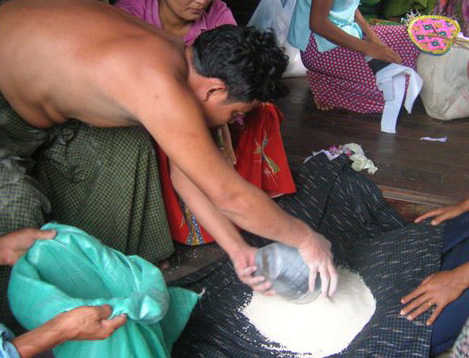
NASHVILLE, Tenn. (BP)–A team of Southern Baptists is on the ground in Bangkok, Thailand, to help national believers from Myanmar deal with the mounting crisis in their country after a May 3 cyclone left 62,000 people dead or missing and drove perhaps 1 million people from their homes.
Five “initial responders,” led by Sam Porter, the Baptist General Convention of Oklahoma’s disaster relief director, are setting up a coordination center and training Myanmar Christians in water purification techniques, said Jeff Palmer, executive director of Baptist Global Response, a Southern Baptist international relief and development organization. The five Oklahomans joined Baptist Global Response team members already on the ground in Bangkok.
“The specialists we have on the ground in Bangkok have training in many areas of disaster relief,” Palmer said. “Some Myanmar national believer partners are coming out to be trained in technical topics such as water purification, as well as an overall plan and methods for responding to a disaster of this magnitude. They also will be part of a meeting to discuss how to coordinate help and get aid more equally distributed.”
The Myanmar nationals will then set up a disaster relief structure in their own country and be prepared to coordinate relief efforts coming from other parts of Myanmar and Asia, Palmer said.
Southern Baptists are focusing on partnerships with Myanmar believers and Christian organizations based in Southeast Asia because relief workers from Western countries are having trouble getting visas into Myanmar, Palmer said. While Baptist Global Response continues to pursue access through official government channels, progress also is being made through informal networks with Asian Christians who have access to Myanmar.
Working through those partners, Southern Baptists have been able to get medicines and water purification materials into the country as well as help local partners purchase food relief that is coming down from northern Myanmar, Palmer said. Approximately $100,000 worth of aid has been funneled into some of the most affected areas — “a drop in the bucket because the needs are enormous and we are committed to help for the long run,” he added.
Water purification is a crucial need because fresh water supplies have been contaminated by ocean water and the decaying bodies of dead people and animals. The World Health Organization reports that cases of diarrhea and dysentery are increasing in the country. As many as 1.5 million people are believed to be at risk for serious health problems in the storm’s aftermath.
“We fear a second catastrophe unless we’re able to put in place quickly a maximum of aid and a major logistical effort comparable with the response to the tsunami,” Elisabeth Byrs of the U.N.’s Office for Humanitarian Affairs told the Associated Press. Myanmar has been showing more willingness to cooperate with the United Nations, she added, but relief efforts still are not reaching the majority of people in need.
Relief agencies need to set up “an air or sea bridge to ship in large quantities of aid as quickly as possible,” she said. “Even if aid had been able to arrive since the first few days, we face an extremely big logistical challenge.”
A team of disaster relief specialists from the Southern Baptists of Texas Convention is standing by to follow up on the Oklahoma team’s work, Palmer noted.
–30–
Compiled by Mark Kelly, an assistant editor at Baptist Press. The Baptist Global Response website is at gobgr.org.
















